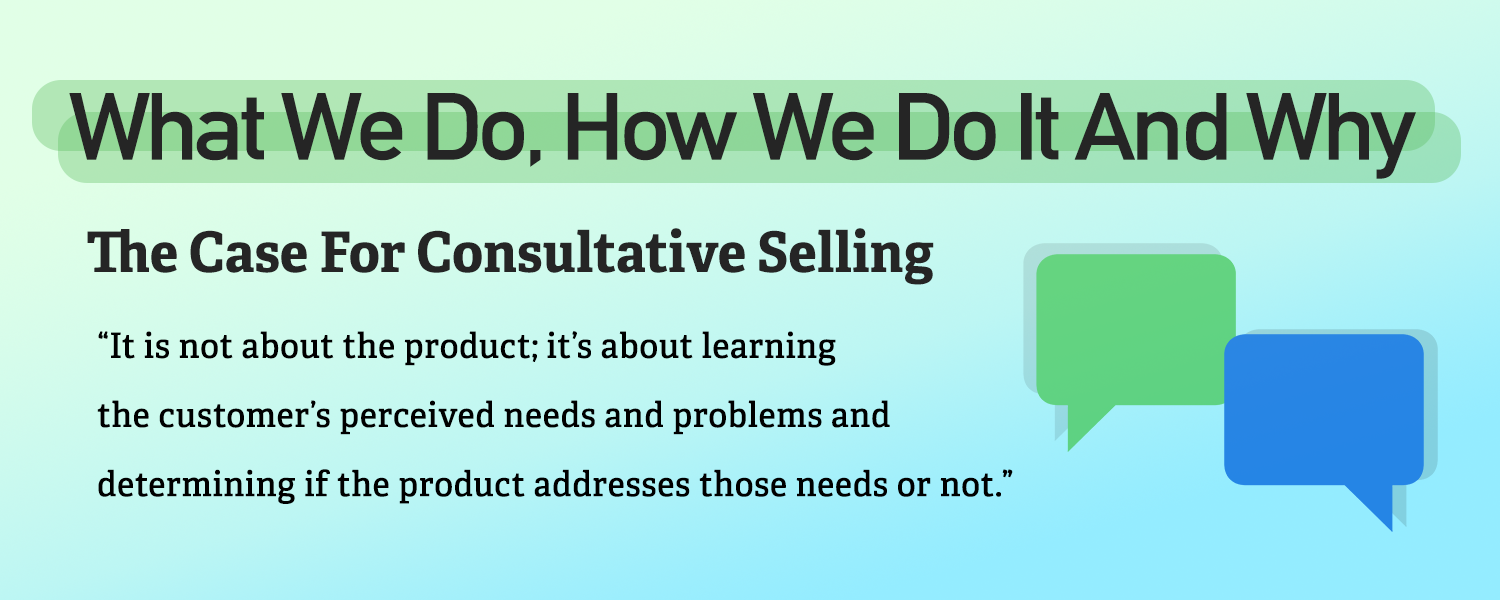What We Do, How We Do It And Why
Our company, Generes & Associates, Inc., has been serving the title, escrow and settlement industry since 1993. We’ve sold and licensed software, offered and performed escrow accounting and other services as demand for such manifested. Having no real “sales” training, we sold by learning what the customers needed to be successful and profitable in their respective businesses. Although we didn’t invent it, we were conducting processes that the sales profession now calls “Consultative Selling.”
Consultative selling is all about bringing value to the customer; it consistently places the customer’s pain/problems in primary focus. It effectively places the salesperson as a consultant to the customer. It is not about the product; it’s about learning the customer’s perceived needs and problems and determining if the product addresses those needs or not. If not, there is no prospect nor sale to be made.
For consultative selling to be effective, a trust relationship must be developed between the prospect and the salesperson. The consultative salesperson must be willing and able to teach the prospect some subject matter that the prospect may not know or without which the prospect’s knowledge is less than complete. The more the salesperson can demonstrate familiarity with the prospects business situation and perceived problems, the faster the trust relationship can be established. Once the prospect begins to trust the salesperson, the more likely that prospect will respect and accept the salesperson’s advice and recommendations. The goal is for the prospect to accept the salesperson as a subject matter expert and trusted adviser. If that goal is attained, the company will more likely have a customer for life.
Title, settlement and escrow software is not a commodity and trying to sell it as a commodity may lead to some sales, depending on the aggressiveness of the salespeople, but it will rarely lead to long term customer relationships. Some prospects may regard such software as a commodity (it’s all pretty much the same, isn’t it?) but the knowledgeable consultative salesperson should be able to quickly dissuade the prospect with a series of probing questions designed to elicit specific pain points that can be addressed by the salesperson’s product and not others.
Selling production software to companies and professionals engaged in the real estate title, settlement and escrow industry requires specialized knowledge into the processes which those companies follow in completing the real estate transaction from file opening to final recording of relevant documents.
Equally important is to understand the local title/settlement customs, practices and challenges each prospect must deal with in each type of transaction.
Real estate transactions are complex in that there are several stakeholders and many moving parts in each purchase/sale or refinance deal.
The stakeholders can include:
Buyer
Seller
Buyer’s attorney
Seller’s attorney
Buyer’s realtor
Seller’s realtor
Lender
Lender representative or broker
Abstractor
Title agent
Closing agent
Title underwriter
Salesperson or other Source of business
Mortgage lien holders
Other lien holders
County clerks and recorders
Vendors for various required services (i.e. survey, home warranty, pest inspection, other inspections, etc.)
It is critical for the customers’ processors to understand the roles and objectives of each stakeholder to a transaction. Similarly, the consultative salesperson must appreciate and understand the roles and goals of the various stakeholders in order to provide the best, most knowledgeable experience for the customers.
The moving parts to a transaction can include:
Purchase/Sale agreement terms and conditions
PS agreement addenda terms and conditions
The loan application
The rate lock date
Changing circumstances of the Buyer and/or Seller
Changing circumstances affecting the Lender
Title problems
Undisclosed liens
Local/regional customs
State and local fees to be imposed on the transactions.
Similar to understanding the roles and objectives of each stakeholder, the consultative salesperson must also be familiar with how the various moving parts, described above, must fit together to make up the whole transaction, especially as to how local and regional differences may influence the process.
The success of and preference for consultative sales in the title, settlement and escrow industry is borne out by history. The earliest companies to develop and sell such software and gained a national footprint used the consultative sales approach and all those companies still exist and compete in the market today. For example:
First Data of Nashville, Tennessee developed a system now called AIM in the late 1970’s and sold it through Stewart Title’s representatives until 2002 when Stewart Title bought AIM from First Data. Today, it is still being sold by Stewart’s representatives.
Landtech Data Corporation launched its software in the late 1970’s, being sold initially by the founder and family until about 1986 when the first of the independent “regional” representatives were launched.
Softpro Corporation in Raleigh, North Carolina started in the mid 1980’s with a direct to market model utilizing a centralized sales staff dialing for dollars but, overtime, morphed into a consultative model where it developed “regional experts” to service different geographic areas.
Title Support Services, now owned by First American, was founded by a former Landtech representative who modeled its sales program after Landtech’s.
Adeptive Software, original producer of Resware, had adopted the consultative approach before being acquired by Qualia. Resware’s independent sales and support partner was Windward Consulting and represented Adeptive in areas across the country.
To be sure, the consultative sales approach is not the only sales method used in the industry. Some of the newer entrants have elected the centralized “dialing for dollars” approach. As noted earlier this approach will result is some sales but not much customer loyalty. Such a direct to market, product sales approach emphasizes overly aggressive sales techniques by sales reps with little or no industry knowledge. Only time will tell if such techniques will work well in this industry. For now, we are sticking with what has proven best for our customers.

